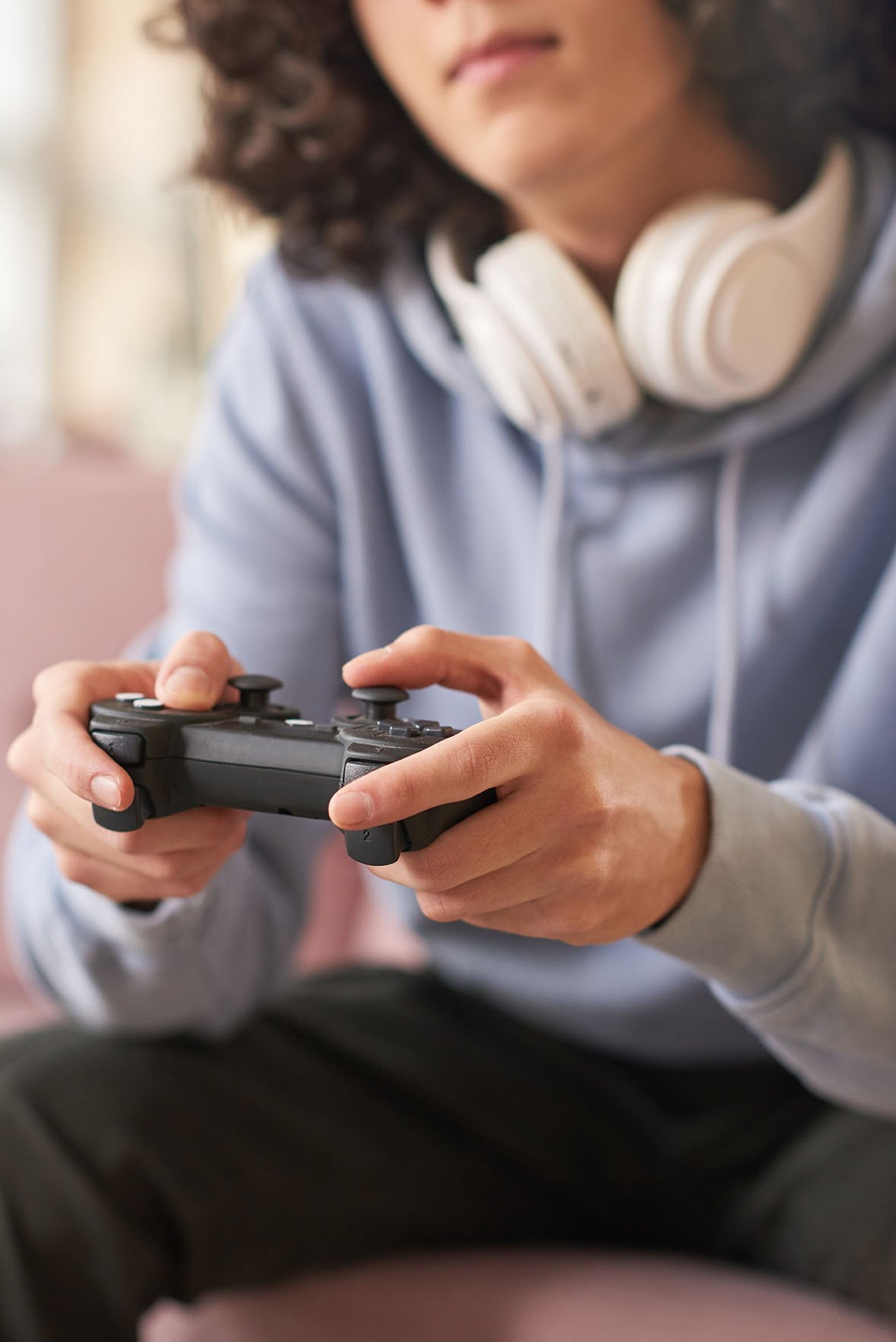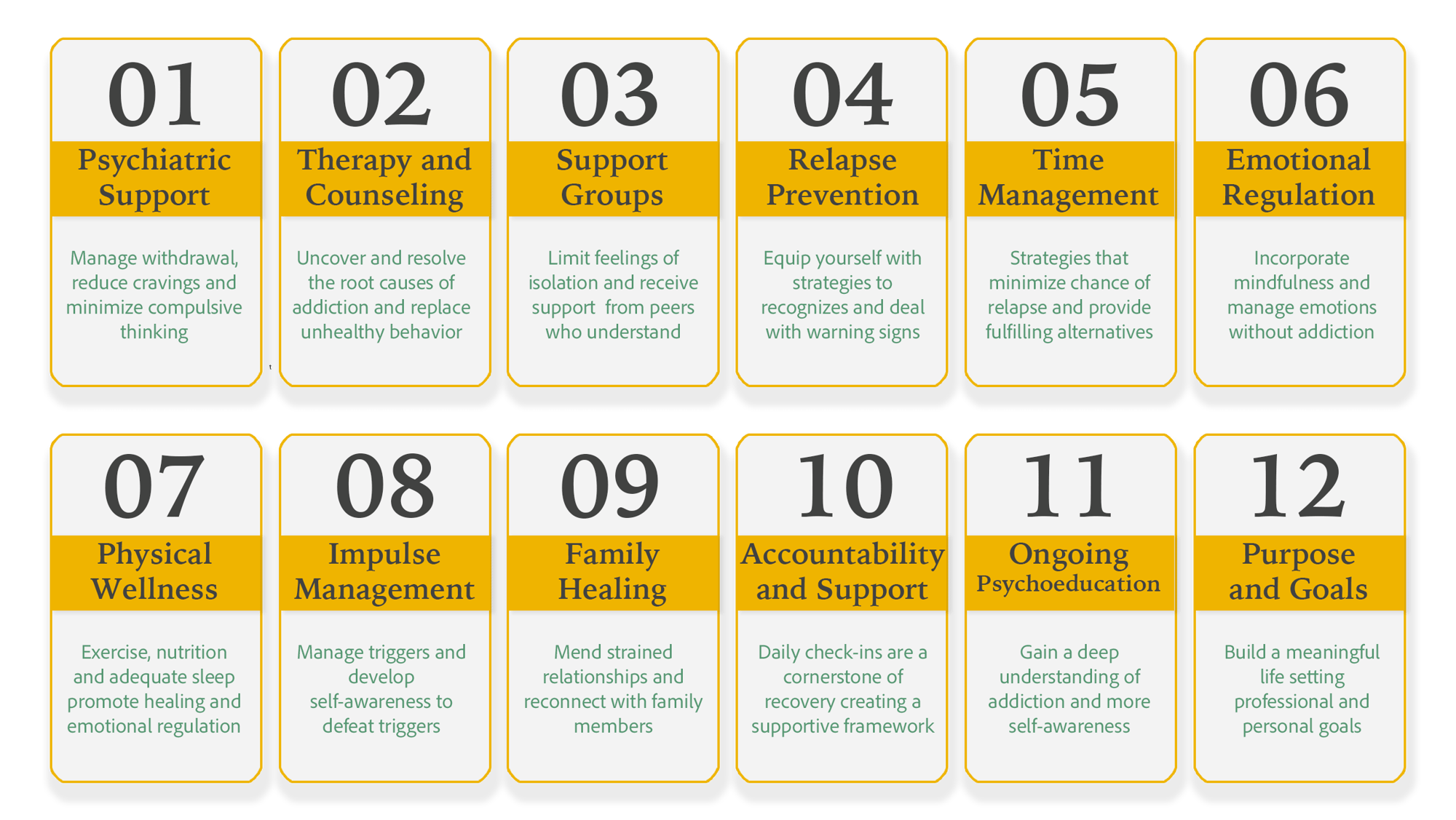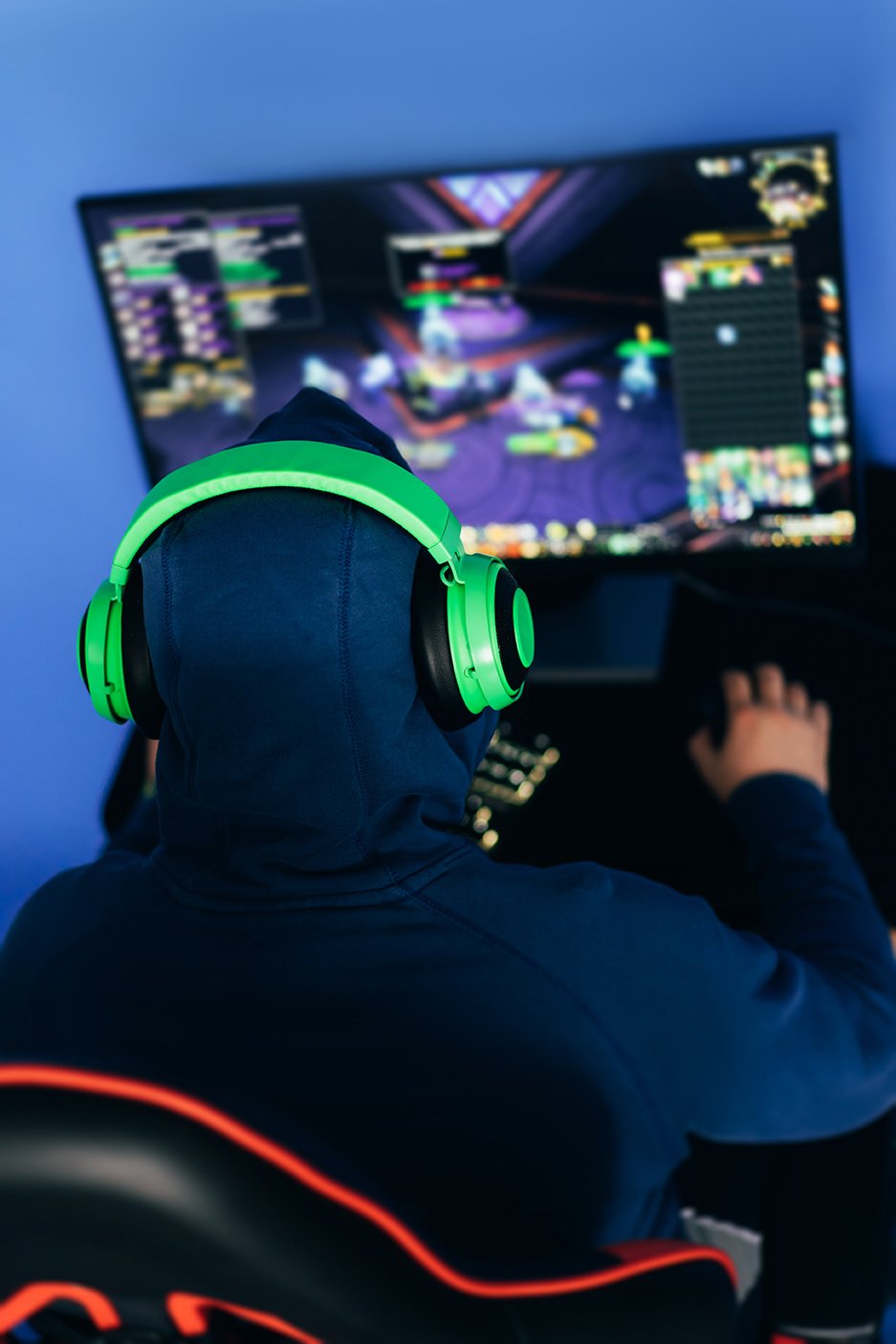Game Addiction Recovery Program
Understanding Video Game Addiction
Video games have evolved into immersive experiences that offer social interaction, achievement, and escape. While gaming can be a healthy hobby, for some, it becomes more than entertainment — it turns into a compulsive behavior that dominates time, attention, and emotions. When gaming starts interfering with relationships, responsibilities, or mental health, it may signal a deeper issue: gaming addiction.
Recognized by the World Health Organization as a behavioral addiction, gaming disorder is marked by an inability to control gaming habits despite negative consequences. Individuals may find it difficult to stop playing, lose track of time, and experience distress when unable to game. This pattern can lead to sleep disturbances, anxiety, depression, and social withdrawal — mimicking the same dopamine-driven cycles seen in other addictions.
For many, gaming becomes a way to cope with deeper emotional challenges like stress, loneliness, or low self-esteem. The escape is real — but so are the consequences. The first step toward healing is recognizing that gaming is being used to fill a void that can be addressed in healthier, more fulfilling ways.
The OnwardWell Game Addiction Recovery Program offers compassionate, non-judgmental support for individuals struggling with video game addiction. Our comprehensive approach includes therapy, recovery coaching, group support, family involvement, and practical tools for restoring balance and building a healthier lifestyle.
Whether it’s learning time management, managing emotional triggers, or finding new sources of meaning and fulfillment, our program helps you regain control of your life — one step at a time.
With the right support, recovery is not just possible — it’s achievable. OnwardWell is here to guide you and your family with expertise, empathy, and care.
What Game Addiction Feels Like
Video games today are more than just entertainment — they offer immersive worlds, social connection, and constant rewards. For many, gaming is a fun and healthy hobby. But for some, it becomes a compulsive behavior that takes over time, attention, and emotional well-being.
Video game addiction, recognized by the World Health Organization as a behavioral disorder, is defined by an inability to control gaming habits despite negative consequences. This can lead to sleep disturbances, anxiety, depression, social withdrawal, and declining performance in school, work, or relationships. Individuals may struggle to stop gaming, feel distress when not playing, and lose interest in other areas of life.
At its core, gaming addiction often serves as an escape from deeper emotional challenges — such as stress, loneliness, or low self-esteem. The pursuit of in-game achievements and constant stimulation can mimic the dopamine-driven cycles seen in other forms of addiction, creating a powerful and self-reinforcing loop.
At OnwardWell, we understand the real-life impact of gaming addiction. Our Game Addiction Recovery Program offers compassionate, non-judgmental support for individuals and families navigating this challenge. Through therapy, recovery coaching, group support, and practical tools, we help clients restore balance, rebuild meaningful connections, and develop healthier coping strategies.
With the right support, freedom from gaming addiction is not only possible — it’s within reach. OnwardWell is here to guide you every step of the way with expertise, empathy, and care.

How the Game Addiction Recovery Program Works
At OnwardWell, addressing video game addiction requires a comprehensive recovery approach — one that offers emotional support, personalized strategies, and meaningful alternatives to screen time. Here’s what the journey through our recovery program looks like:
Intervention and Intake: Creating Awareness and Opening the Door to Change
Because individuals struggling with gaming addiction often don’t self-identify, the process frequently begins with a family-led intervention or intake session. This is a space for open, compassionate conversation where our team — including coaches and therapists — helps the individual reflect on their gaming habits without judgment. We also gather key insights about emotional triggers, lifestyle challenges, and personal goals to create a personalized recovery experience.
Personalized Recovery Planning: Mapping a Path Forward
With a clear understanding of the individual’s needs, we collaborate to develop a customized recovery plan. This plan outlines achievable goals — such as reducing gaming time, restoring healthy routines, and developing emotional coping tools. More than just limiting gaming, we help individuals explore fulfilling offline alternatives, including hobbies, physical activity, and social engagement.
Individual Recovery Sessions: Therapy and Coaching
Participants engage in weekly one-on-one sessions that combine therapeutic counseling and recovery coaching. Therapy helps address emotional and psychological patterns behind the addiction, while coaching focuses on daily strategies, accountability, and skill-building. Together, they provide deep, personalized support for lasting change.
Therapeutic Groups: Community Support and Connection
Group sessions create a space for participants to connect with others facing similar challenges. Led by experienced facilitators, these sessions offer peer insight, emotional support, and the opportunity to develop social skills in a supportive environment. Group work reduces isolation and reminds participants they are not alone.
24/7 Offline Support: Rebuilding a Life Beyond Screens
Recovery is about more than just reducing screen time — it’s about creating a meaningful life offline. We encourage participants to build screen-free routines, explore new activities, and strengthen relationships. With support from coaches and therapists, individuals learn to find joy, purpose, and accomplishment in real-world experiences.
Family Involvement: Repairing Relationships and Rebuilding Trust
Gaming addiction often affects the whole family. We work with loved ones to rebuild trust, improve communication, and create healthy boundaries. Family involvement fosters a supportive environment where participants feel understood and empowered, while helping families heal and grow together.
Long-Term Support: Sustaining Progress and Preventing Relapse
Recovery doesn’t end after the initial phase. We provide long-term support through follow-up sessions, maintenance planning, and relapse prevention tools. Whether through individual or group support, our goal is to help participants sustain progress, build resilience, and continue creating balance and fulfillment in their lives.
The Components of Full Recovery
True recovery isn’t just about stopping harmful behaviors — it’s about healing the mind, body, and spirit to create lasting change. At OnwardWell, we believe recovery is holistic, addressing all areas of life affected by addiction.
Our program is built around 12 core components that support comprehensive, sustainable recovery. These pillars guide every step of the journey, helping you move from addiction to a life of balance, purpose, and freedom.

What You’ll Gain Through Coaching
Our Game Addiction Recovery Program goes far beyond managing screen time — it’s about reclaiming control, building resilience, and rediscovering fulfillment in life. Here’s what participants can expect to gain:
A Healthier Relationship with Gaming
Rather than focusing solely on abstinence, we help participants develop mindful, intentional gaming habits, balanced with real-world responsibilities, relationships, and goals.
Emotional Awareness and Regulation
Participants learn to recognize and manage the emotional triggers — such as stress, anxiety, or boredom — that drive compulsive gaming. Through therapy and skill-building, they develop healthier ways to cope and respond to emotional challenges.
Stronger Relationships and Social Skills
With support from family involvement and group sessions, participants rebuild trust and strengthen communication with loved ones. They also gain tools to foster meaningful connections beyond the gaming world.
New Routines and Meaningful Activities
Our program helps participants explore new interests, hobbies, and passions, promoting joy and fulfillment beyond screens. By building a structured, engaging daily rhythm, they reconnect with real-life experiences that matter.
Improved Time Management and Focus
Through coaching and practical strategies, participants gain tools to set boundaries, manage their time, and increase productivity — at school, work, and in personal life.
Increased Confidence and Motivation
As participants make progress, they experience a boost in self-confidence, motivation, and self-worth. With consistent support, they overcome guilt and shame, and build a stronger, more empowered identity.
Long-Term Resilience and Support
Recovery is a journey. We equip participants with relapse prevention strategies, long-term planning tools, and access to ongoing support to maintain progress and handle setbacks with confidence.

Who The Game Addiction Program Is For
The OnwardWell Game Addiction Recovery Program is designed for individuals ready to break free from the cycle of compulsive gaming and reclaim control over their lives — and for the families who support them. Whether gaming has recently become problematic or the struggle has persisted for years, our program offers the structure, tools, and guidance needed to move forward.
This program is a strong fit if you or your loved one:
-
Find it difficult to stop gaming, even when you want to
Despite good intentions, gaming continues at the expense of responsibilities, relationships, or personal goals. -
Experience guilt, shame, or frustration about gaming habits
Gaming feels like an escape, but stopping feels overwhelming — and past attempts to quit may have led to frustration or relapse. -
Notice that gaming is impacting relationships, work, or school
Gaming has begun to interfere with family life, friendships, academics, or job performance. -
Want to regain control but need guidance and accountability
You’re ready for change, but know that professional support can make the difference in staying on track and building sustainable habits. -
Are looking for healthier ways to cope with stress or emotions
Gaming may have become a coping mechanism for stress, anxiety, or boredom — now it’s time to explore healthier, more balanced strategies.
Our program combines therapy, coaching, practical tools, and community support to help individuals create real, lasting change. Whether you’re the person struggling or a concerned parent or partner, we provide personalized support and resources to build healthier habits and restore relationships.
Family participation is vital to long-term recovery. Gaming addiction often affects family dynamics, and involving loved ones helps rebuild trust, improve communication, and create a supportive environment for change. Whether you’re seeking help or supporting someone you care about, we work closely with both individuals and families to ensure everyone feels heard and supported.
Recovery doesn’t happen in isolation. Together, we’ll help you or your loved one thrive — both online and offline.
How do I know if gaming is a problem for me or my loved one?
Signs of video game addiction include difficulty controlling gaming time, neglecting responsibilities, withdrawing from family or friends, and experiencing negative emotions like guilt or frustration about gaming habits. If gaming interferes with daily life, it may be time to seek support.
Can someone recover from gaming addiction without quitting games completely?
Yes. Our program focuses on creating a healthy relationship with gaming. Rather than quitting altogether, participants learn to set boundaries and integrate gaming into a balanced lifestyle, with time for other priorities and fulfilling activities.
Accordion What is the role of family members in the recovery process?
Family participation is essential to long-term success. Our program helps rebuild trust, improve communication, and establish healthy boundaries between participants and their families. Recovery is not just about the individual—it involves creating a supportive environment for everyone.
What happens in the intake session?
The intake session is an opportunity for the individual, coach and relevant family to understand the situation and identify personal goals for recovery. It’s a conversation designed to foster self-awareness without judgment, allowing us to tailor the program to meet the individual’s needs.
How long does the program last?
The length of the program varies depending on each participant’s needs and progress. Some individuals benefit from short-term coaching to address immediate issues, while others prefer longer-term support to build sustainable habits and maintain progress.
Is the program available online?
Yes. Our coaching sessions are available online, offering flexibility and accessibility to participants no matter where they are located. We also encourage offline activities as part of recovery, helping participants reconnect with the real world.
What if the person struggling with gaming doesn’t want help?
It’s common for individuals with gaming addiction to resist help. Our intake process is designed to foster self-reflection in a non-confrontational way, helping participants become more open to change. Family involvement is also crucial in encouraging participation and creating a supportive environment for recovery.
Is there video game addiction withdrawal?
Yes, individuals may experience withdrawal symptoms when they try to reduce or stop gaming. These symptoms can include irritability, anxiety, depression, restlessness, and an increased urge to play. Our coaches help participants navigate these symptoms with healthier coping strategies and support.
How much gaming is too much?
While there’s no exact number of hours that defines addiction, gaming becomes problematic when it starts to interfere with daily responsibilities, relationships, and personal well-being. If gaming becomes the primary way of managing emotions or avoiding real-life stress, it may signal a deeper issue.
Take the Next Step
Breaking free from video game addiction begins with a single step — reaching out for support. Whether you’re seeking help for yourself or a loved one, the OnwardWell Game Addiction Recovery Program is here to guide you toward a healthier, more balanced life.
With therapy, personalized coaching, family support, and practical tools, you’ll have everything needed to regain control, rebuild relationships, and create sustainable change. Every day is an opportunity to take back your time, your focus, and your well-being.
Fill out the form below to schedule a confidential consultation. A member of our recovery team will reach out to discuss your situation, answer your questions, and explore how our program can help you or your loved one move forward.
You don’t have to face this challenge alone. Together, we’ll help you restore balance, reconnect with what matters, and thrive — beyond the screen. Fill out the form today and take the first step toward lasting recovery.

